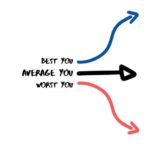Daily reflection is an important habit. And finding time to reflect on the day-to-day events will always be valuable. But every once and a while it’s necessary that we perform a reflection on the years that have passed.
Better yet, just reflect on your whole life.
I mean this whole Daily Athlete venture started with an article that was inspired by reflection.
When we are “in the moment”, our judgment can often be clouded by emotion and irrational thinking. We usually lack clarity and a sense of perspective during these moments. It’s not until we take a step back and reflect that we begin to realize what exactly went down.
In this week’s article, Mike Grypma shares what he has discovered after some thoughtful reflection on his volleyball career. He has really pinpointed the root cause of his emotional angst and as you will see, he now understands what he needs to do differently. Unfortunately, like many former athletes, Mike no longer has a chance to apply these lessons to his sport.
But you do.
My hope is that after reading this article, you will be more mindful of how you evaluate yourself and figure out who you are doing this all for. Better yet, I hope that you can take some time to reflect on how far you’ve come and potentially see more clearly the ways in which you could have been better.
And since life doesn’t have to be all about failure, notice how you’ve been awesome.
So without any further ado, I give you Mike.
Playing to be Seen
by Mike Grypma
Looking back, I have so much to be thankful for during my high school, club, and university years’ volleyball. Those seasons have given me so many opportunities such as traveling, winning championships, developing my character, and making relationships and friendships that will last a lifetime. But if you are like me, you know that sport comes with its fair share of disappointments, setbacks, injuries, and failures as well.
I was never the most gifted athlete physically, which set me at a disadvantage. Though I was able to excel and find my way onto the court consistently on my high school teams, I was not able to realize this in my club volleyball years. Many athletes that I talk to at the University level tell me about all the big games, the big points and individual accolades that they received. I never knew what this was like. Thankfully, I got to play with some pretty talented teams and players, some of whom have gone on to play at the National Team level, but that was never me, and every club season was a challenge to try and stay relevant, to carve a role out for myself so that I could contribute in some way, and maybe, just maybe, receive playing time and get the attention from coaches, teammates, and spectators that I so desperately desired.
This desire for recognition was my greatest downfall.
I played youth volleyball with a lot of jealousy, constantly asking myself questions like:
Why him?
Why does he get the attention?
Is he really even that good?
Am I even really that good?
Why won’t coach talk to me?
Why won’t coach play me?
Why do I consistently fail in practice?
.
.
.
But you wanna know the worst part?
I did nothing to change this mindset.
I waited and waited and waited for my big breakthrough, my big moment, or my body to mature. That’s not how it works. I thought that once I could have specific moment or game that could allow my “career” to take off that I wouldn’t have all these jealous feelings towards others, and frustrations with myself.
I remember one big moment that really shifted my focus to actively pursue change. I had the pleasure of playing on a high-performance club team with young men a grade above me in school, and at our national championships, one of our best players went down due to injury. I was ready. I had been preparing continuously in my mind for weeks and weeks for an opportunity such as this, and I believed in myself that I could step up to the challenge, and contribute to the group. My coach at the time looked down at the four of us U18 athletes, then at the two U15 players that we had called up for the tournament, and subbed in the U15 player who played my position.
It was devasting to say the least.
However, he played amazing. For a young kid, he played with no fear with the big boys, and ended up helping us win the set and eventually the match, and I was happy for him. But boy, was that ever a shot to the ego. The coach didn’t trust me, or rather didn’t believe that I was ready, thus killing my confidence, but I let it kill my confidence. To this day I believe it was one of the best and most humbling lessons I received in my youth sporting career.
It was hard. But it made me better.
As athletes, we are consistently taught to go out and seize opportunity — to be men and women of action. But what is the point if we act in a way to make ourselves stand out in the eyes of others? What is the point if we train and compete consciously or subconsciously to impress our coaches, teammates, admirers, or even our parents?
In that situation with the younger kid on my team, I know my mindset had I been subbed into that match would be focused heavily on trying to impress my coach, and prove myself to him that I could play in big games. I would have played to be seen.
As I transitioned to university ball, my motivation was much better but continued to be extrinsically focused on avoiding embarrassment by letting my team down by blowing routine plays, misexecuting “easy” skills, and killing drills with my mistakes. To compound the errors, I continued to constantly look to my coaches for any form of feedback, affirmation, no matter if I was playing in a drill, or if I was on the sidelines. It developed an unhealthy sense of fear, decreasing my confidence even more.
I implore young athletes in any sport to avoid at all costs playing your game to be seen. It’s not productive, it’s not a healthy way to play or train, and I would argue it is preventing you from being your best. It will let you down.
Final Thoughts
My advice is for you to remain practical in your approach to bettering yourself as an athlete, and maintaining an intrinsic or internally rewarding focus. For example, find ways to get extra reps and extra touches and try to get creative in doing so. Be proactive during practices, and maintain a growth mindset, rather than fixating on your mistakes, past failures, or what your teammates and coaching staff’s perception is of you.
Most importantly: Be you.
Don’t allow yourself to be placed in a box and compared to athletes who have come before you, and will come after. No one else will be like me and will never have exactly the same successes and failures that I have. Be authentic, but also aspire to be the best possible version of yourself.
-Mike





